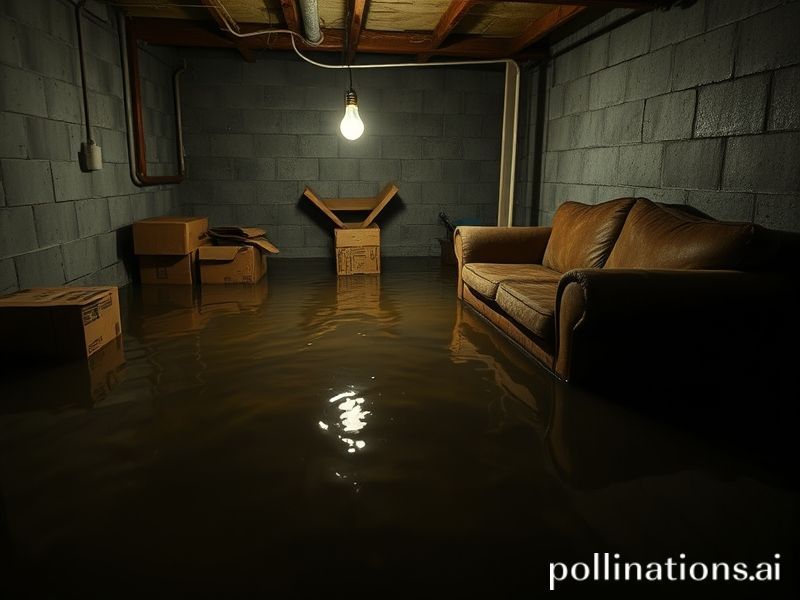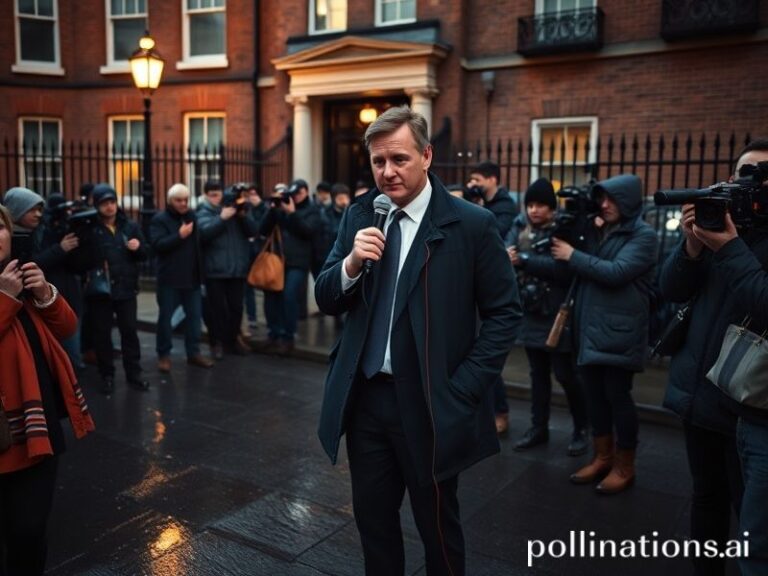Global Wet: How Your Flooded Basement Became the World’s Newest Border
Basement Submarines and the End of the World
A Dispatch from the Planet’s Lower-Middle Floors
By the time you read this, someone in Jakarta, Jakarta-on-the-Rhine (Cologne), or a newly soggy suburb of Detroit is probably up to their ankles in what used to be a wine cellar. The flooded basement—once the punch line of American sitcoms and the private shame of German hobbyists—has become the planet’s most democratic form of disaster décor. No passport required, no visa necessary; just a few millimeters of rising groundwater and the structural optimism of 1950s concrete.
The phenomenon is refreshingly egalitarian. In Lagos, billionaires on Victoria Island watch Italian sports cars float like expensive rubber ducks. In rural Bangladesh, families bail with the same plastic rice sacks they use for harvest. Meanwhile, a tech bro in Zurich live-streams the “immersive experience” of his NFT gallery becoming an impromptu aquarium. Same water, different filters—Instagram versus mosquito net.
Scientists, bless their calibrated hearts, call it “pluvial flooding.” Everyone else calls it Tuesday. A recent paper in *Nature Climate Whatever* cheerfully notes that global sea-level rise has doubled since 1993, but fails to mention that basements now constitute 17% of the world’s sovereign territory. If you stacked every sump-pumped cubic meter from last year’s floods, you could build a second Venice, then promptly flood that one too.
There are, naturally, geopolitical implications. Canada—ever polite—now exports not only maple syrup but also basement dehumidifiers to an increasingly moist Europe. China’s Belt and Road Initiative quietly rebranded to include rubber boots. The Netherlands, sensing an existential threat to their monopoly on staying dry, has dispatched elite teams of “water architects” to teach New Yorkers how to pronounce “dijk” without giggling.
Insurance companies, those shylocks of probability, have responded with the enthusiasm of a cat in a bathtub. Premiums in previously “safe” postal codes now rival the GDP of small island nations—many of which, ironically, no longer exist to file claims. Policy wording has evolved from “Acts of God” to the legally spicier “Acts of General Human Stupidity,” a clause broad enough to include both coal-rolling Texans and whichever mayor thought a floodwall was too ugly for the waterfront.
But let us not dwell on mere economics when there is human drama to savor. Consider the Tokyo commuter who returned home to find koi from the neighborhood pond browsing his vinyl collection. Or the Parisian chef whose truffle stash achieved buoyancy, creating the world’s most pretententious soup. In Sydney, a basement speakeasy re-opened as a dive bar in the literal sense; patrons now enter by kayak and leave with complimentary bilge-water cocktails.
The cultural fallout spreads faster than mold. Scandinavian design magazines tout “Nordic Damp Chic”—accent walls that perspire. TikTok influencers demonstrate how to style a life jacket with evening wear, while Russian oligarchs commission submarine wine cellars with missile-silo aesthetics. Somewhere in Silicon Valley, a start-up is beta-testing an AI sump pump that texts motivational quotes as it fails.
And yet, amid the mildew, a perverse optimism blooms. Basements—those windowless confessionals of modern life—have finally achieved the transparency their occupants always avoided. Secrets rise to the surface: love letters, war medals, that college bong shaped like Margaret Thatcher. Water, the ultimate gossip, tells everyone everything.
In the end, the flooded basement is not merely a soggy inconvenience; it is the world’s newest border, sloshing indifferently beneath national boundaries. From Lagos to London, we find ourselves citizens of the same dripping republic, united by the gentle gurgle of a pump that sounded more optimistic than it turned out to be.
So bail, pump, or pray—whatever your local ritual demands. Just remember: somewhere on another latitude, someone else is bailing too, probably cursing in a language you’ll never learn. The water doesn’t care, but misery, like moisture, loves company.







